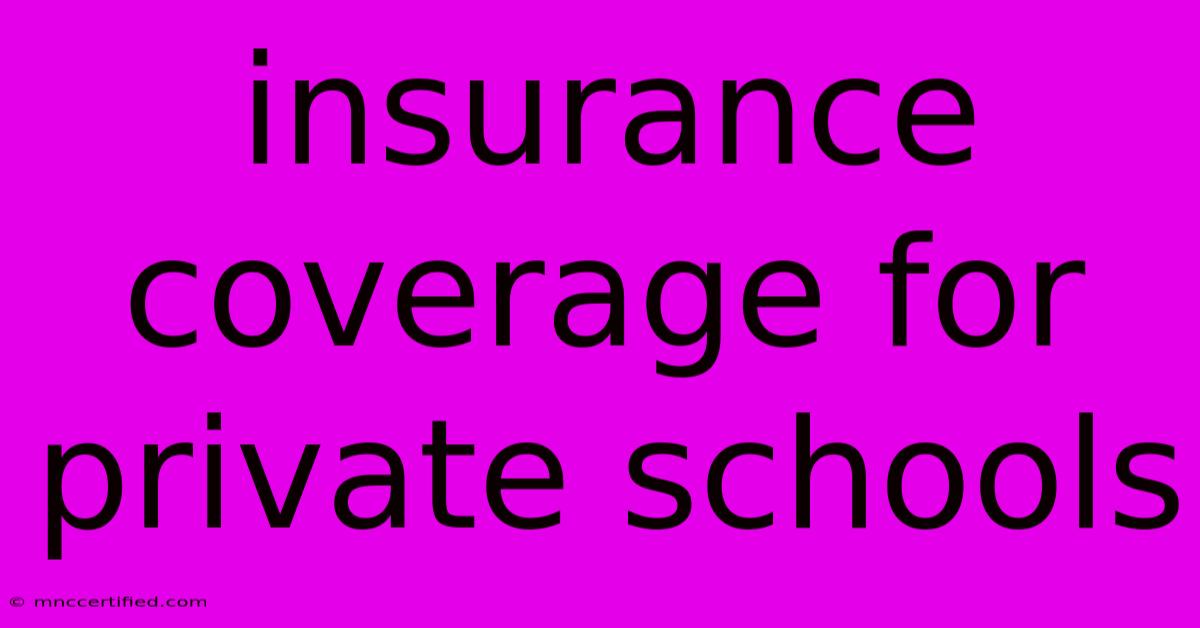Insurance Coverage For Private Schools

Table of Contents
Navigating Insurance Coverage for Private Schools: A Comprehensive Guide
Private schools, with their unique needs and responsibilities, require a robust insurance plan to protect their assets, students, and staff. Choosing the right coverage can be a daunting task, but with the right information, you can ensure your school is adequately protected.
Understanding the Essentials of School Insurance
1. Property Insurance:
This coverage safeguards your school's physical assets, including buildings, furniture, equipment, and even valuable artwork. It provides financial protection against losses caused by fires, storms, vandalism, and other unforeseen events.
2. Liability Insurance:
This essential coverage protects your school from claims arising from injuries, property damage, or accidents on school grounds. It can cover legal expenses, settlements, and judgments.
3. Workers' Compensation Insurance:
This coverage is legally mandated in most states and protects your employees in case of work-related injuries or illnesses. It covers medical expenses, lost wages, and other benefits.
4. Student Accident Insurance:
This optional coverage offers financial protection to students in case of accidents, both on and off school grounds. It can cover medical expenses, lost wages, and even disability benefits.
5. Educators Legal Liability (E&O) Insurance:
This policy specifically safeguards your teachers and administrators from claims of negligence or misconduct.
Factors to Consider When Choosing Insurance Coverage:
- School Size and Location: Larger schools with more students and staff generally require more comprehensive coverage. Geographic location also plays a role, as areas with higher risk factors may require increased coverage.
- Type of School: Boarding schools, specialized schools, and schools with unique facilities may have specific insurance needs.
- Budget and Risk Tolerance: Schools need to balance the cost of insurance with their risk tolerance.
- Reputation and Financial Stability: It's crucial to work with a reputable insurance broker who understands the needs of private schools and offers a financially stable insurer.
Additional Considerations for Private Schools:
- Cybersecurity Insurance: As schools rely increasingly on technology, protecting against cyberattacks and data breaches is crucial.
- Transportation Insurance: If your school provides transportation services, ensure you have adequate coverage for school buses and other vehicles.
- Sexual Abuse Coverage: This coverage is increasingly important as schools strive to protect their students and staff from allegations of sexual abuse.
Key Tips for Getting the Best Insurance Coverage:
- Compare Quotes: Get quotes from multiple insurance brokers and compare coverage options and premiums.
- Review Policy Documents: Carefully review the policy documents to ensure you understand the coverage details, limitations, and exclusions.
- Ask Questions: Don't hesitate to ask your broker questions to clarify anything you don't understand.
- Keep Records: Maintain accurate records of your insurance policies and claims for future reference.
Conclusion:
Navigating the world of insurance coverage for private schools can feel overwhelming. By understanding the different types of coverage, considering your school's unique needs, and working with a reputable broker, you can create a robust insurance plan that safeguards your school, students, and staff.

Thank you for visiting our website wich cover about Insurance Coverage For Private Schools. We hope the information provided has been useful to you. Feel free to contact us if you have any questions or need further assistance. See you next time and dont miss to bookmark.
Featured Posts
-
How Amsterdam Attacks Unfolded
Nov 09, 2024
-
Independent Trading Company Size Chart
Nov 09, 2024
-
Tony Todd A Life Remembered 1954 2024
Nov 09, 2024
-
Nicole Scherzinger Addresses Russell Brand Hat Controversy
Nov 09, 2024
-
What Insurance Does Aegis Dental Accept
Nov 09, 2024